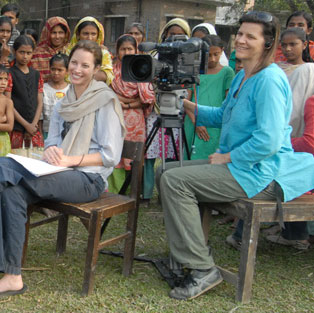A look at protecting the health and rights of women now -- from the Tribeca Film Festival to the open-source platform of Ushahidi.
For the first time in 20 years, maternal mortality appears to be declining significantly, according to a recent Lancet report. Of course the goal is not simply to reduce deaths but to improve health and protect women's rights. To survive and thrive, girls and women require a comprehensive package of sexual and reproductive health services (contraception, maternity care, safe abortion, and diagnosis and treatment of sexually transmitted infections including HIV/AIDS), along with comprehensive sexuality education and protection of their human rights.
Anyone who has seen the brilliant Girl Effect knows that this is not just a women's issue. It is at the core of peace, prosperity and the environmental health of our planet. To view firsthand how meeting the most basic needs of women transforms communities, don't miss Christie Turlington Burns' (yes you can hate her -- she's gorgeous, smart, kind and deep) No Woman No Cry at the Tribeca Film Festival next week through the end of April.

Last May, President Obama announced the launch of a $63 billion, ten-year Global Health Initiative, which promotes an integrated approach to improving health outcomes worldwide. The core principles underpinning the Global Health Initiative mirror the vision of partners of one of my favorite orgs: the IWHC: a comprehensive, woman-focused model of care centered on the realities and needs of local communities. Investments such as these will not only help eliminate maternal mortality, but will bring us closer to securing a just and healthy life for women everywhere.
But it's no longer OK to sit back while the USAid, IWHC's partners, and the heroes in Christy's film do all the work. And thanks to Ushahidi, an open-source platform developed in Kenya, we now have the power at our fingertips to anonymously report violence against women, instances of human trafficking, terrorist activity, drug trafficking, gang violence, natural disaster victims, and deaths. Ushahidi was used in both Haiti and Chile to receive text messages reporting trapped victims and were plotted on a "crisis map" thus enabling rescue workers to reach the victims more quickly. According to the New York Times, "Ushahidi remixes have been used in India to monitor elections; in Africa to report medicine shortages; in the Middle East to collect reports of wartime violence; and in Washington, D.C., where The Washington Post partnered to build a site to map road blockages and the location of available snowplows and blowers." Imaging signage on subways, Times Square, billboards, radio and TV spots actually giving us all the power to make our neighborhoods safe and help others. As my friend and blogger Mishele Wells says, "Social media saving lives? Who says there's such a thing as 'too much information?'" Let's hope that Ushahidi gives folks something better to do than tweet about the health of their fingernails.Photo by Clancy McCarty via Nowomannocrythemovie.com.